I . Survey
(i) Geographical Location
Liaoning Province, which is called" Liao"for short, is located in the south of the northeast region of China, with geographical coordinate o f 118°53′- 125°46′east longitude and 38°43′- 43°26′north latitude. The land area of Liaoning province is 145,900km2, making up 1.5% of the total land area of China; its water area is 10,000km2, making up 6.8% of the total water area of China; its area of sea is up to 150,200km2 and its total continental coastline is 2,178km, accounting for 12% of the total continental coastline of China.
Liaoning province is contiguous with Jilin province in northeast, neighbors Inner Mongolia Autonomous Region in northwest, borders on Hebei province in southwest, faces the DPRK across Yalu River and is close to Yellow Sea and Bohai Sea in its south.
Liaoning is a traffic hub on the way from the northeast region to the south of Shanhai Pass and it is also an important gateway and front connecting the northeast region and Inner Mongolia with the world and the Europe-Asia Land Bridge.
(ii) Climate Characteristics
Liaoning is in the continental monsoon climate area of temperate zone, with such climate characteristics as: long cold period, strong wind in plain, humid in east and dry in west, concentration of rainfall, suffi cient sunshine and distinct four seasons.
In Liaoning, the average year-round temperature is about 5-10℃ , the average year-round rainfall is 500-1,000mm in general and the year-round sunshine duration is 2,300-2,900 hours in most areas. Except Xifeng and Xinbin of which the frost-free days are below 130 days and the south of Dalian and Changhai of which the frost-free days are more than 200 days, the frost-free days in other areas of Liaoning are 130-200 in general.
(iii) Population and Nationalities
Liaoning province now has a population of 42.21 million, in which 24.77 million are city and township dwellers, accounting for 58.7% of the total population; 17.43 million are country dwellers, accounting for 41.30% of the total population. Liaoning is a multi-nationalities province, having 44 nationalities in total including the Han Nationality, the Man Nationality, the Mongol Nationality, the Hui Nationality, the Korean Nationality and the Xibo Nationality etc. The total population of minorities is 6.55 million, accounting for 16% of the total population of Liaoning. There are fi ve minorities of which the population is over 10,000, they are the Man Nationality, the Mongol Nationality, the Hui Nationality, the Korean Nationality and the Xibo Nationality. Other major nationalities are the Zhuang Nationality, the Miao Nationality, the Tujia Nationality, the Tahur Nationality and the Yi Nationality.
(iv) Natural Resources
There are 115 kinds of mineral resources found in Liaoning, including 69 kinds with proven reserves. There are larger reserves of ferrous metals, non-ferrous metals and non-metals, in which the reserves of iron, boron, magnesite, diamond, talcum, jade and solvent limestone etc. rank the first in China; there are also abundant reserves of such non-ferrous metals as gold, silver, copper, aluminium and zinc etc. and such special non-metal ores as asbestos; the reserves of oil and natural gas in Liaohe Oil Field account for 15% and 10% of the total reserves in China respectively, and the crude oil production in Liaohe Oil Field ranks the third place in China.
Liaoning now has 3,920,000 ha of forest land, with forest coverage rate of 28.7%, and has 2,270,000 ha of grassland, grass hills and grass slopes, so Liaoning is a suitable place for developing animal husbandry. As Liaoning traverses Yellow Sea and Bohai Sea, it has long coastline where prawns, abalones, scallops and sea cucumber etc. teem. Liaoning is also rich in rice, wheat, corn, sorghum; soybean, peanuts, cotton and sunflower; Liaodong Peninsula and the low hilly region in the west of Liaoning are the important production base of fruits, Ginseng, pilous antler, marten and tussah, and their fruit yield ranks the fi rst in China.
As one of five major sea salt producing areas in China, Liaoning has more than one million mu of salt pan. Along the coastline in Panjin and Yingkou, there are nearly one million mu of reed wetland which is an important material for the pulp and paper industry.
(v)Infrastructure and Transportation
Airports and Harbors
In Liaoning there are 6 airports ( in S h e n y a n g , D a l i a n ,Anshan, Jinzhou, Dandong and Chaoyang respectively) which open air-routes to more than 100 large and medium-sized cities of China and such countries and regions as Japan, Russia, South Korea and Hong Kong etc.. The mileage of air-routes for civil aviation reaches 330,000 km and the number of air-routes reaches 112.
In Liaoning there are 5 harbors (i.e. Dalian Port, Yingkou Port, Dandong Port, Jinzhou Port and Huludao Port) which open sea routes to more than 140 countries and regions in five continents and have 120 berths in total, including 86 berths of 10 thousand tons, and the annual cargohandling capacity is nearly 200 million tons.
Highways
By the end of 2005, Liaoning's total road mileage had reached 53,521 km, in which the expressway mileage is 1,773 km, having an increase of 8.3%.
Railways
By the end of 2005, Liaoning's total railway mileage had reached 3,922.1km. The turnover volume of freight transport by railway reached 119.48 billion ton-km and the freight traffic reached 142.71 million tons; the turnover volume of passenger transport by railway reached 38.14 billion person-km and the passenger traffic reached 95.03 million persons.
Finance and Insurance
In 2005 the cash incomes of the financial institutions in Liaoning reached RMB2,991.546 billion yuan, the cash expenditures reached RMB2,994.357 billion yuan and the accumulative net currency issuance reached RMB2.812 billion yuan. By the end of 2005, the year-end (RMB) deposits balance of the fi nancial institutions in Liaoning reached RMB1,196.695 billion yuan.
By the end of 2005, Liaoning had 59 listed companies (including overseas-listed companies), of which 50 companies are domestically listed companies which have issued 48 A-shares and 5 B-shares with a total market capitalization of RMB89.416 billion yuan.
I n 2005 the premium income of Liaoning's insurance industry reached RMB22.462 billion yuan.
Some Financial Institutions
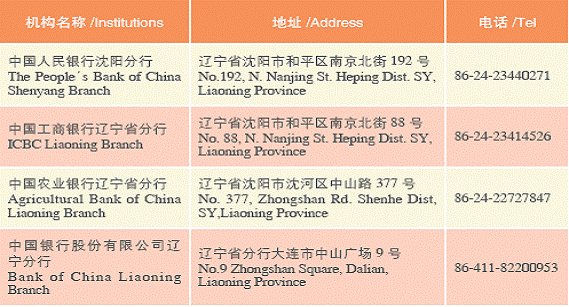
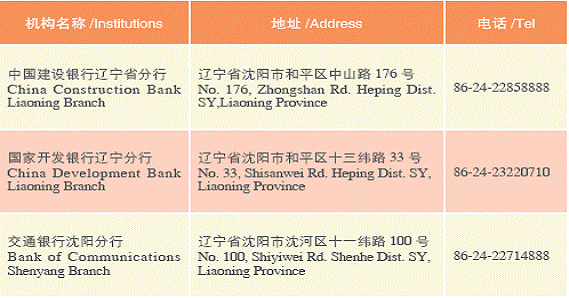
Telecommunication
By 2005, the total length of optical fibre cables in Liaoning reached 150,000km, and the number of telephone users reached 30.44 million with a tele-density of 72 units/100-persons, in which the number of fixed telephone users is 16.6 million and the number of mobile users is 13.84 million; the number of INTERNET users is 6.06 million and the number of broadband access users is 1.83 million.
Internet
Liaoning has 2.915 million Internet users and the number of Internet-connected computers is 0.96 million; the number of domain names registered under CN in Liaoning is 9,793 and the number of websites is 20,446.
(vi) External Contacts
Sister Provinces/States and Sister Cities
Up to 2005, the number of the provinces and states, which have established"sister-province/state" relations with Liaoning, and the foreign cities and counties, which have established" sister-city/county" relations with the cities of Liaoning, is 78 in total. There are 15 provinces and states which have established" sister-province/state" relations with Liaoning.
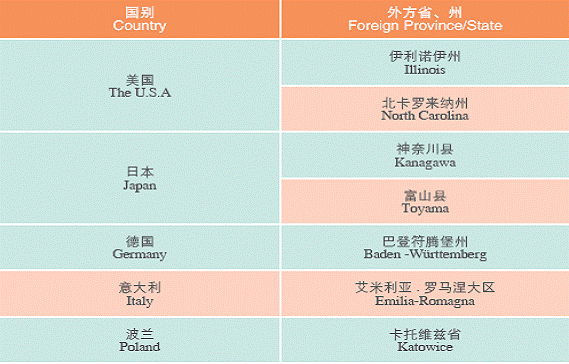
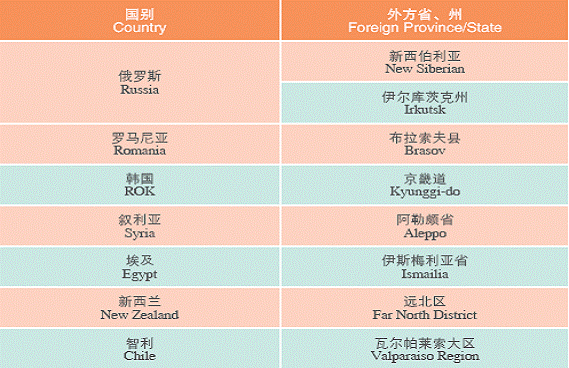
International Expositions
China International Equipment Manufacturing Exposition (CIEME)
Dalian International Fashion Festival in China
China (Dalian) International Software Fair
China Dalian Import & Export Commodities Fair
CIEME is a state-level exposition approved by the State Council and is held in Shenyang every autumn.Since 2002, four CIEMEs have been successfully held. The CIEME reflects the new successes of our country and the world achieved in equipment manufacturing and provides a platform for both domestic and overseas manufacturers to unfold their strength and seek for partners. CIEME is a grand international event of equipment manufacturing industry, integrating product show, trading and ordering, academic seminar, negotiation on investment and technical cooperation, and it is an opportunities-making exposition gathering the international famous brands.
(vii) Higher Education and Scientifi c Research
Now there are 70 tertiary institutions in Liaoning, including such domesticallycelebrated institutions as the Northeastern University, China Medical University and Liaoning University etc., with 0.55 million on-campus students. There are more than 1.7 million various kinds of scientific and technological professionals. Liaoning now has 1,132 institutes for scientific research & technical development; there are 51 academicians of the Chinese Academy of Sciences and the Chinese Academy of Engineering; there are 58 state-level and provincial-level key industrial test bases and labs as well as engineering centers and achievements promotion centers. Liaoning enjoys a vital position in China, even the world, in respect of the research and study in such 25 disciplines and specialties as Metal Materials, Industrial Automation and Rice Breeding etc.. In 2005, Liaoning achieved 3,962 achievements in total, including 2,765 applied technological achievements.
(viii) Tourism
Famous Scenic Spots
Liaoning province is an important tourist destination in the Northeast Asia and has many world famous historical sites. In the central Liaoning there exist Shenyang Palace Museum," The Three Mausoleums out the Strategic Pass" and other historic sites survived from the Qing Dynasty; in the south there exist the historic sites of modern war and in the west there exist the historical sites survived from the Qin Dynasty, the Han Dynasty, the Liao and Song Dynasties, the Ming Dynasty and the Qing Dynasty. Famous mountains, beautiful rivers and marvelous scenes can be found throughout Liaodong Peninsula and the corridor region in the west of Liaoning. The Submerged Great Wall at Jiumenkou of Huludao city, Shenyang Palace Museum, the Yongling Tomb in Fushun, the Fuling Tomb and Zhaoling Tomb in Shenyang are recognized by the UNESCO as the World Cultural Heritages. Liaoning owns the world's biggest jade Buddha – Anshan Jade Buddha; has the world's longest waterfilled cavern – Benxi Water Cavity which
can be visited by riding boat; has the world's biggest polar aquarium – Dalian Hutan Polar Aquarium; has the world's largest "visitor" coming from the outer space 1.9 billion years ago – Shenyang ancient meteorite; and has the second biggest reed field in the world – Panjin Shuangtaizi Wetland Natural Reserve; in addition, such marvelous sceneries as the Strange Slope in Shenyang, the boundary between the Yellow Sea and Bohai Sea in Dalian, Snake Island, the Penholder Mountain in Jinzhou and the Red Beach in Panjin etc. are all widely publicized; Qianshan Mountain, Phenix Mountain, Chessboard Mountain, Yiwulu Mountain, Bingyugou Valley, Haitang Mountain, Yalu River, Sarr, Qinghe River, Five-Ladies Mountain and Tianhua Mountain are graceful and beautiful.
Characteristic Products and Foods
Liaoning has five characteristic products, i.e. sea cucumber, kelp, Magnolia sieboldii, Fushun amber crafts and silk flower. Besides these, Liaoning's apples, pears, hazels, hawthorn, prawn, clam, abalone, scallop, mink, sable, tussah, tussah silk, wild jujube seed, tobacco, Schisandrins, Ginseng, pilous antler, WildGinger, Fushun Jet Carving, Xiuyan Jade, the feather picture series of Dazheng Hall of the Imperial Palace in Shenyang, Liaoning, Dalian's crystal products, Xiuyan Jade of Anshan, Liao Inkstone of Benxi, Fuxin's agate, and the Paleozoic fossil found in the west of Liaoning are well known.
The Liao-style Dishes is a kind of folk cuisine which is developed on the basis of Manchu-style Dishes and the Northeaststyle Dishes and by absorbing the merit of the dishes of other styles. Its features are melting multi-fl avors into one dish, making no mix of salty and sweet, being crisp, welldo and fragrant, being highly-seasoned, adding edible oil and starch before dish-up, and having nice dish-up.
Besides Liao-style Dishes, the other flavor dishes of Liaoning are the" Feast of
Complete Manchu-Han Courses"," Laobian Jiaozi"," Ma's Shaomai"," Jinzhou-style Salted Vegetables", assorted hot pot", Stewed chicken with Ginseng"," Stewed Plumshaped fish maw"," Fried drumsticks with abalone"," Li Liangui Pancake"," Na's Braised Pork" and Baofayuan Dishes etc.
II . Economy
(i) GDP Data
In 2005, the GDP of Liaoning province reached RMB800.5 billion yuan, the proportion of the primary industry, the secondary and the tertiary industry was 6.1%, 60.7% and 33.2% respectively, and the per-capita GDP was RMB18,965 yuan.
(ii) Data of Industry and Agriculture
Industry
Liaoning is a major industrial province in China and has solid industrial foundation. It has established a sound industrial system with full range of industrial categories,with metallurgical industry, electromechanical industry, petroleum, chemical industry and building materials industry as the leading industry. In 2005, the industrial added value accomplished by Liaoning's industrial enterprises was RMB 300.737 billion yuan.
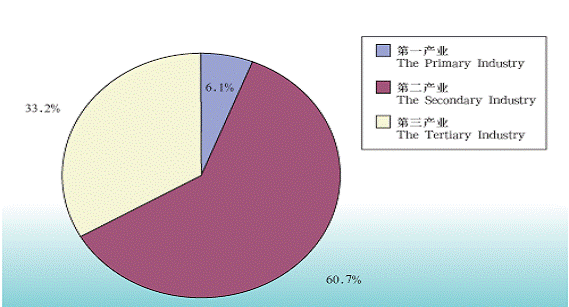
The Output of Main Industrial Products in 2005
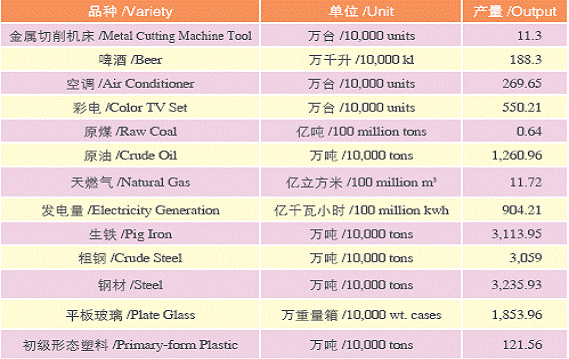
Agriculture
Liaoning has 55 million mu cultivated land and better natural resources such as water, soil, sunshine and heat. In 2005, the sown area of grain crops in Liaoning was 3,052 kha. and the sown area of non-grain crops was 744.7 kha.
Liaoning has 14 modern agricultural demonstration bases and a number of "leading" projects which focus on the deep-processing of agricultural and sideline products. In 2005, the total power of agricultural machinery of Liaoning was 18 million kw, and the tractor-ploughed, mechanically-sown and mechanically-harvested level of the whole province was 78.5%, 48.85% and 9.15% respectively.
The Yield of Major Farm Products in 2005
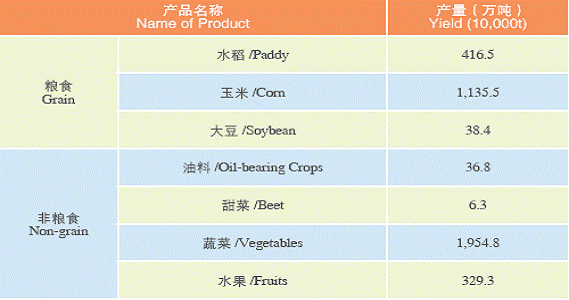

(iii) Data of Trading and Investment
Import & Export
According to the statistics of the customs, the total import and export volume of Liaonng in 2005 was US$41.013 billion, in which, the total export volume was US$23.439 billion and the total import volume was US$17.574 billion. Liaoning trades with 213 countries (regions) and its top five major trading partners are Japan, South Korea, the U.S.A., Germany and Saudi Arabia.
The Import & Export Volume of Liaoning in 2005
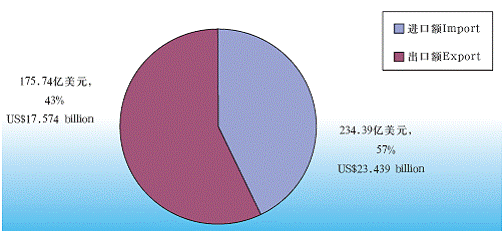
Major Trading Partners of Liaoning in 2005
Unit: USD 10,000

The Major Export Modes of Liaoning in 2005

Utilization of Foreign Capital
The foreign direct investment actually utilized by Liaoning in 2005 was US$3.59 billion. More than 130 world famous companies have invested and launched factories in Liaoning, they are the GM, PFIZER, DuPont and Goodyear from the U.S.A, the Total SA and Michelin from France, the Thyssen, BMW and BASF from Germany, Mitsubishi, Panasonic, SANYO, T O S H I B A a n d C A N O N f r o m J a p a n , and Hyundai and LG from South Korea. According to the statistics, 2,686 contracts concerning foreign direct investment projects were signed in 2005, and the amount of contracted foreign investment was US$11.016 billion yuan. Among the newly contracted foreign direct investment projects, there were 357 big projects of which the amount of contracted foreign investment is more than US$10 million. The amount of the investment in manufacturing industry, real estate, information transmission, computer and software industry was US$9.389 billion.By the end of 2005 there were 16,542 foreign-funded enterprises which registered with the administration for industry and commerce of Liaoning.
Foreign Cooperation
In 2005 Liaoning accomplished a turnover of US$2.66 billion in respect of foreign economic cooperation; accomplished a turnover of US$652 million in respect of foreign project contracting and labor service cooperation through signing 900 project contracts; and exported 69,400 labors in total. Up to 2005, the number of in-service overseas labors exported from Liaoning had reached 71,100.
Statistics of Liaoning's Achievements in Foreign Economic Cooperation

Outward Investments
In 2005, Liaoning invested and launched factories in 75 countries and regions, the number of cumulative overseas investment projects was 439 (including overseas offices), the accumulative investment amount totaled up to US$618.826 million and the cumulative investment amount by Chinese side totaled up to US$420.0552 million
Statistics of the Labors Exported from Liaoning
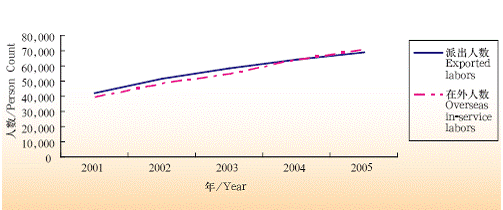
Amount of Approved Overseas Investments of Liaoning in 2001-2005
Unit:US$10,000

Statistics of the Count, Amount and Royalty of the Import Contracts Classified by Way of Introduction of Liaoning Province in 2005
Amount Unit: US$10,000
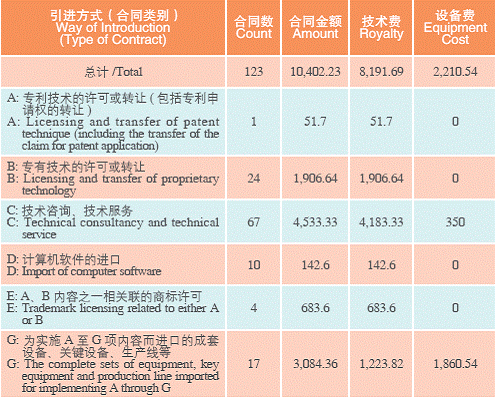
Introduction of Technology
In 2005, Liaoning signed 264 new contracts concerning introduction of technology, and the total contract amount was US$365 million. The total amount of the new contracts that the key state-owned and state holding enterprises of Liaoning signed for introducing technology in 2005 was US$270 million.
Commodity Circulation
In 2005, the sales of the wholesale and retail trading enterprises of Liaoning totaled up to RMB734.19 billion yuan, in which, RMB486.27 billion yuan is accomplished by the wholesale trade and RMB247.92 billion yuan is accomplished by the retail trade.
In 2005 the total retail sales of consumer goods of the whole province was RMB 299.9 billion yuan. By region, the retail sales of consumer goods in urban district was RMB252.37 billion yuan and that in counties and lower level was RMB47.52 billion yuan. By sector, the retail sales of wholesale and retail trading sectors was RMB247.92 billion yuan; the retail sales of catering was RMB45.31 billion yuan; and the retail sales of other sectors was RMB6.67 billion yuan. By ownership, the retail sales of the state-owned economic sector was RMB17.46 billion yuan; the retail sales of the collective-owned sector was RMB10.84 billion yuan; the retail sales of the joint-stock sector was RMB42 billion yuan; the retail sales of the private sector was RMB49.18 billion yuan; the retail sales of individual economy was RMB168.31 billion yuan; the retail sales of foreignfunded enterprises was RMB7.86 billion yuan; and the retail sales of the enterprises funded with the investment from Hong Kong, Macao and Taiwan was RMB3.59 billion yuan.
Commodity Exchange Market
There are 2,824 consumable goods markets in Liaoning in 2005, among which Wuai Market, and Xiliu Market of Haicheng city have become the well known commodity distribution centers both in China and abroad.
Amount of Approved Overseas Investments of Liaoning in 2001-2005
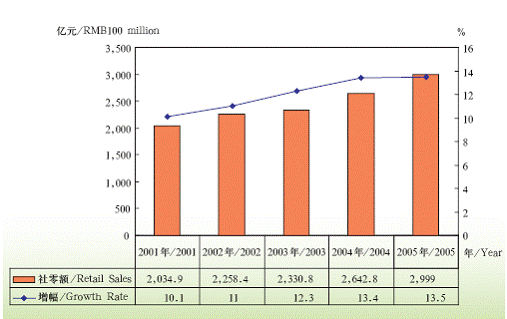
Raw Material Market
There are 261 raw material markets in Liaoning. Some of these markets, such as Shenyang Steel Center Wholesale Market and Dalian Petrochemical Products Exchange Center, with their high capacities of dealing with bulk commodities and radiant distribution functions, have gradually become the centers of distribution and transaction, where the market prices are set, and information released. In 2005, the turnover of raw material for production in Liaoning province reached RMB 1,095.38 billion.
Logistics
With more than 780 professional logistic distribution enterprises in Liaoning, a logistic distribution system has been formed that can reach every corner of the province, and provide agency distribution services to some renown enterprises such as Coca cola, and Pepsi Cola, etc. Volume of food spot transaction in Dalian rates the highest in Asian. Dalian Shuangxing Fruit & Vegetable Logistic can be deemed as the largest distribution center of imported fruits.
Exposition Industry
At present, there are over 20 sites that can be served for exposition in Liaoning with a total area of about 150,000 square meters. 5 of the exposition centers have an area of more than 10,000 square meters respectively. Shenyang and Dalian have become the nation-wide regional exposition centers. Shenyang International Exposition Center occupies an area of 75,000 square meters. Its outdoor exposition area is 34,000 square meters. The area of Dalian Xinghai International Exposition Center is 14,000 square meters. Its outdoor exposition area is 6,000 square meters.
Shopping Street
In the 14 cities under the jurisdiction o f Liaoning province the rear 138 shopping streets, among which there are both comprehensive shopping streets, such as Zhongjie Street, Taiyuan Street in Shenyang, and Qingniwa Street in Dalian, and specialized shopping streets with professional features, such as Sanhao Street in Shenyang. There are also some shopping streets featuring in ethnic culture, such as shopping street with a style of Qing Dynasty.
Shopping Malls
In large-scale shopping malls, there are not only world famous department stores, marketplaces, restaurants, but also indoor shopping streets, theme parks, cinemas, sport and entertainment facilities, etc. Xinglong Big Family in Shenyang and New Mart Leisure Shopping Plaza are such kind of shopping malls.
III . Investment
(i)Policy and Administrative Rules Catalogue of Related Laws
Foreign Trade Law of the People's Republic of China
Customs Law of the People's Republic of China
Law of the People's Republic of China on Import and Export Commodity Inspection
Law of the People's Republic of China on Chinese-Foreign Equity Joint Ventures
Law of the People's Republic of China on Chinese-Foreign Contractual Joint Ventures
Law of the People's Republic of China on Foreign-Capital Enterprises
Company Law of the People's Republic of China
Law of the People's Republic of China on the Entry and Exit Animal and Plant
Quarantine
Law of the People's Republic of China on Control of the Entry and Exit of Aliens
Law of the People's Republic of China on the Control of the Exit and Entry of Citizens
Securities Law of the People's Republic of China
Income Tax Law of the People's Republic of China for Enterprises with Foreign Investment and Foreign Enterprises Individual Income Tax Law of the People's Republic of China
Law of the People's Republic of China on the Administration of Tax Collection Environmental Protection Law of the People's Republic of China
Law of the People's Republic of China on Evaluation of Environmental Effects
Law of the People's Republic of China on Promotion of Cleaner Production
Law of the People's Republic of China on Prevention and Control of Desertifi cation
Marine Environment Protection Law of the People's Republic of China
Law of the People's Republic of China on the Prevention and Control of Atmospheric Pollution
Law of the People's Republic of China on Prevention and Control of Environmental Pollution by Solid Waste
Law of the People's Republic of China on Prevention and Control of Water Pollution
Law of the People's Republic of China on Prevention and Control of Environmental Noise Pollution
Law of the People's Republic of China on Prevention and Control of Radioactive Pollution
Frontier Health and Quarantine Law of the People's Republic of China
Labour Law of the People's Republic of China
Trade Union Law of the People's Republic of China
Searching Website for the Related Laws
1 . Searching System of Laws and Regulations of China (website of National People's Congress of China)http://law.npc.gov.cn:87/home/begin1.cbs
2. China Legislative Information Network System http://www.chinalaw.gov.cn/jsp/jalor/index.jsp
3. Ministry of Commerce http://www.mofcom.gov.cn
The above-mentioned websites are for reference only.
(ii) The Industries Encouraged, Restricted and Prohibited
1. The development and production of seed of grain, oil crop, vegetable and fruit,(excluding trans-genetic plant's seed) etc.( Chinese parties control stakes);
2. Breeding of meat chicken, live pig, calf, lamb, cow, deer, cash mere goat and further processing of the relevant products;
3. Development of follow-up industries concerning some state key ecological engineering projects, such as converting land for forestry and pasture;
4. Processing and comprehensive utilizing of oil shale, magnesium and zircon. (Chinese parties relatively control stakes);
5. Spinning and knitting of high quality cotton, wool, hemp, silk (tussah silk),and chemical fi ber; and garment processing;
6. Further processing of natural medicine, Chinese patent medicine, medicine material and the production of relevant derivatives.(excluding the production of vitamin C , penicillin material and other items that have been prohibited by the" Category of Instructions for Foreign-invested Industries") ;
7. New-type dry processing cement clinker production with a daily output of more than 4,000 tons;
8. Production of methanol products from coal with large scale equipment and technology (above 600,000 tons/year);
9. Further processing of million tons ethylene and its down-stream products;
10. Production of meridian tyre;
11. Manufacture of metal package, automatic storage & retrieval system and logistic equipments;
12. Manufacture of auto components and parts;
13. Manufacture of marine diesel engine, auxiliary machine, component, and parts;
14. Development and manufacture of digital medical equipment and key parts;
15. Further processing of high precision bronze strip;
16. Manufacture of steel wire and extra fine steel wire and rope;
17 . Medical institution, with approval, foreign investors can control stakes;
18. Construction and operation of city centralized heat and gas supply system, and water supply and drainage pipe line network. With approval, foreign investors can control stakes;
19. Development and protection of tourist sites and the construction and operation of their ancillary facilities;
20. Projects concerning deep processing and alternative industries in resource exhausted cities. With approval, foreign investors can enjoy incentive policies.
Others
Opinions of the Central Committee of the Communist Party of China and the State Council of the People's Republic of China, on Implementation of the Strategy to Revitalize Northeast China and Other Old Industrial Bases.
Implementation Opinions of the General Office of the State Council of the People's Republic of China, On Further Promoting the Expanding of Opening up to the Outside World of the Old Industrial Base in the Northeast Areas of China Opinions of Six National Ministries including Ministry of Commerce, on Pre-Actively Using Foreign Direct Investment in a Reasonable and Effective Way and Implementation of the" Opinions on Implementation of the Strategy to Revitalize Northeast China and Other Old Industrial Bases."
Websites for Searching Relevant Laws
1. Searching system of NPC websites for China laws and regulations.
Website: http://law.npc.gov.cn:87/home/begin1.cbs
2. Full text searching system of China legislative information network
Website: http://www.chinalaw.gov.cn/jsp/jalor/index.jsp
3. Official website of Ministry of Commerce
Website:http://www.mofcom.gov.cn/
4 . Website of Liaoning Foreign Economic and Trade Office
Website: http://www.china-liaoning.org/
(iii) Procedure for Establish-ment of Enterprises
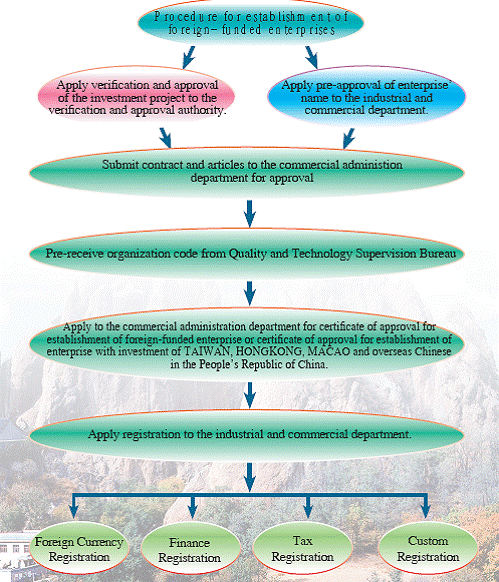
Regulation on Employment
Foreign invested enterprises can, according to their needs of operation, recruit personnel by themselves. The personnel employed must be 16 years old or above.
The personnel who conducts works that could be poisonous or harmful to human health, or do some especially exhausting laborious works, must be 18 years old or above. Foreigner who wants to work in China must have employment certificate and work permit certificate.
(iv) The Residence Environment
The administration policies with respect to the exit from and the entry into the country
For entry into China, foreigners shall apply for visas from Chinese diplomatic missions, consular offices or other resident agencies abroad authorized by the Ministry of Foreign Affairs. In specific situations foreigner may, in compliance with the provisions of the State Council, apply for visas to visa-granting offices at ports designated by the competent authorities of the Chinese Government. The entry of nationals from countries having visa agreements with the Chinese Government shall be handled in accordance with those agreements.
For exit from China, foreigners shall present their valid passports or other valid certificates. In order to facilitate residences, the Liaoning province has taken the following measures:
1. Launch the trusted enterprise system in the exit and entry administration for the foreign-related enterprises. For the trusted enterprises, when they are handling various certificates and visas (endorsement), it is not necessary to meet the applicants personally, the liaison person of the enterprises can handle these matters in lieu of them, without submitting the copy of the business license and application report and the copy of their passports; if they are applying for the permit of residence or temporary residence and extension or the changes on the purposes of visa, besides the legal materials shall be submitted, only the signature on the application form and seal by legal person of the enterprise or its authorized personnel are needed for formalities.
2. For the three kinds of foreigninvested enterprises or ventures, namely, the Sino-foreign joint ventures, cooperative businesses and exclusively foreign-owned enterprises in China that hare invested in Liaoning for over two years, the operation of which is in good condition or the investment of which is substantial and which has made remarkable contribution to the economy of Liaoning province, their management staff can be granted multi-entry visas that is effective for 2-4 years and the residence permit for foreigners for the corresponding period. For the Taiwanese businessman who has made investment of over 5 million US Dollars, the business person and his/her spouse and their children shall be granted the multi-entry visa and the temporary endorse valid for five years.
3.In the frontier organs of Shenyang and Dalian, the office of China-DPR Korea Region Exit and Entry Pass (Version A) shall be set up to facilitate the persons outside frontier area to come to Korea for trade.
Employment license
The employer shall apply for the employment permission if he/she intends to employ foreigners and may do so after obtaining the approval and" The People's Republic of China Employment License for Foreigners"(hereinafter referred to as the "Employment License").
The post to be filled by the foreigner recruited by the employer shall be the post of special need,a post that cannot be filled by any domestic candidates for the time being but violates no government regulations. No employer shall employ foreigners to engage in commercialized entertaining performance,except for the persons qualified under Article 9(3)of this Rule.
Any foreigners seeking employment inChina shall meet the following conditions:
(i)18 years of age or older and in good health condition;
(ii)with professional skills and job experience required for the work of intended employment;
(iii)with no criminal record;
(iv)a clearly-defined employer;
(v)with valid passport or other international travel document in lieu of the passport(hereinafter referred to as the "Travel Document").
Foreigners seeking employment in China shall hold the Employment Visas for the entry(In case of agreement for mutual exemption of visas,the agreement shall be followed), and may work within Chinese territory only after they obtain the Employment Permit for Foreigner(hereinafter referred to as the" Employment Permit")and the foreigner residence certificate.
Foreigners without residence certificate (i.e. holders of F,L,C or G-types visas),and those who are under study or interim programs in China and the families of holders of Employment Visas shall not work in China.In special cases,employment may be allowed when the foreigner changes his status at the public security organs with the Employment License secured by his employer in accordance with the clearance procedures regulated in this Rule, then the foreigner changes his status at the public security organs with the Employment License and receives his Employment permit and residence certificate.
Foreigners may be exempted from the Employment License and Employment permit when they meet any of the following conditions:
(i)Foreign professional technical and managerial personnel employed directly by the Chinese government or those with senior technical titles or credentials of special skills recognized by their home or international technical authorities or professional associations and foreigners holding Foreign Expert Certificate issued by China's Bureau of Foreign Expert Affairs;
(ii)Foreign workers with special skills who work in offshore petroleum operations without the need to go ashore for employment and hold" Work Permit for Foreign Personnel Engaged in the Offshore Petroleum Operations in the People's Republic of China".
Foreigners may be exempted from the Employment License and may apply directly for the Employment Permit by presenting their Employment Visas and relevant papers after their entry when they meet any of the following conditions:
(i)Foreigners employed in China under agreements or accords entered into by the Chinese government with foreign governments or international organizations for the implementation of Sino-foreign projects of cooperation and exchange;
( i i ) Chief representatives and representatives of the permanent offices of foreign enterprises in China.
The Flow Chart for Foreigners to Apply for Employment License in Liaoning, China
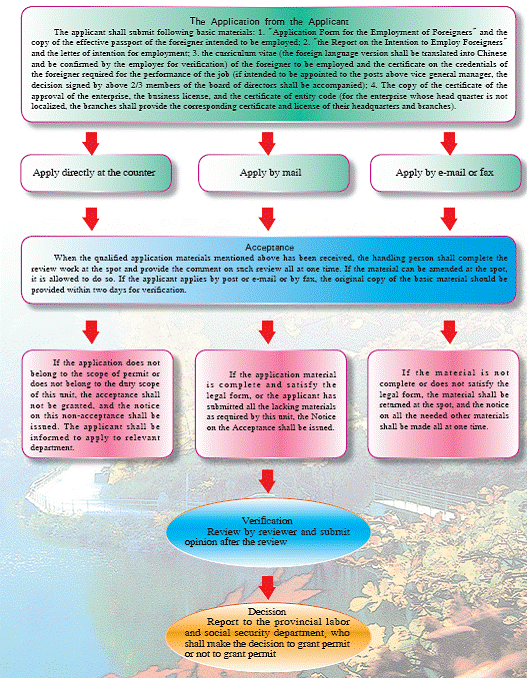
Residence permit
The application for permanent residence by foreigners
(i) Having direct investment in China, stable investment in China for three years in a row, and having a sound taxation record.
1. Having made investment of over USD 500,000 in industries of encouraged type as specified in the Catalogue of Industries of Foreign Investment released by the State;
2. Having made total investment of over USD 500,000 in counties in the western part of the country or in counties that are major targets of poverty relief work undertaken by the State;
3. Having total investment of over USD 1 million in the central part of the country;
4. Having total investment of over USD 2 million in China.
(ii) Having assumed in China the posts of deputy general manager or deputy director of plants or higher level posts or posts of associate professors or associate research fellows and similar posts for more than four years in a row, and the period of stay in accumulation being no shorter than three years in China and having sound taxation record.
1. Institutions subordinate to the various ministries under the State Council or to the provincial level people's governments;
2. Key higher learning schools.
3. Enterprises or institutions executing key engineering projects or major scientific projects of the State;
4. High-tech enterprises, foreign invested enterprises in encouraged type, foreign-invested advanced technology enterprises or foreign-invested exportoriented enterprises.
(iii) Having major and outstanding contributions to China or needed urgently by China.
(iv) Spouses and unmarried children aged less than 18 years old of personnel mentioned in items 1 to 3 of this article.
(v) Spouses of Chinese citizens or of foreigners having obtained permanent residence in China, whose marriage has lasted for fi ve years, and who have lived in China for fi ve years in a row, the annual stay in China being no shorter than nine months, and who have stable and secured living status and place to live.
(vi) Unmarried children aged less than 18 years old who come to China to live with their parents.
(vii) Persons having no direct relatives abroad entering China to live with direct relatives in China, who are over 60 years old, have lived in China for five years in a row, whose annual stay in China being no shorter than nine months and have stable and secured living status and places to live.
Time period of year mentioned in this article refers to the continuous period of time prior to the day of application.
Persons mentioned in item 2 of paragraph1 of article 6 in this set of regulations, at the time of application, should also submit the following materials:
(i) Proof of post or title of the persons issued by the units where they work;
(ii) Certificates of foreign experts or certificates of employment of foreigners;
(iii) Registration certificate, annual inspection proof and personal tax payment proof of the units where they work; if the units are foreign-invested enterprises, the certificate of approval of foreign-invested enterprises and proof of combined annual inspection should also be provided;
(iv) Persons of enterprises or institutions executing major engineering projects or scientific projects of the State should provide testifying documents for the projects issued by the competent authorities of the provincial level people's governments or ministries;
Persons working for high-tech enterprises should provide certificates of high-tech enterprises; persons working for encouraged type foreign-funded enterprises, foreign-invested advanced technology enterprises or foreign-invested export oriented enterprises should provide letter of confirmation of the encouraged type foreign invested projects, or letter of confirmation of foreign-invested advanced technology enterprises or letter of confirmation of foreign-invested export-oriented enterprises.
The required materials for the application of permanent residence
Fill in the Application Form of Foreigners for Permanent Residence in China; Valid foreign passports or identification capable of substituting passports; Certificate of health issued by sanitation and inspection and quarantine agencies appointed by the Chinese government or issued by foreign sanitation and medical agencies accredited by Chinese embassies or consulate offices; Proof of no criminal record abroad recognized by Chinese embassies o r consulate offices; Four latest two-inch front hat-free color photos.
The Flow Chart for Handling the Residence Permit
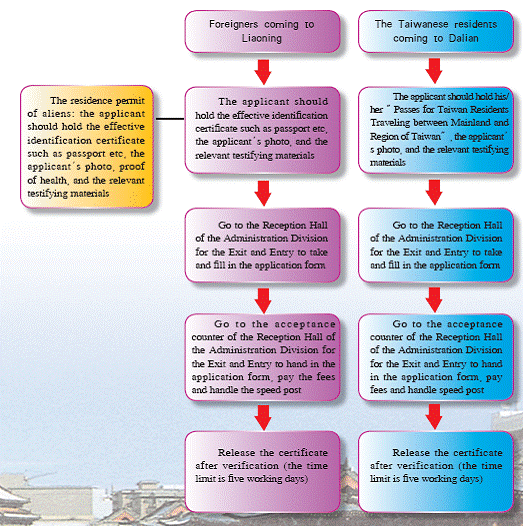
Remarks
1. The main legal basis for above measures:" Law of the People's Republic of China on the Control of the Exit and Entry of Citizens" and the rules for its implementation;" Law of the People's Republic of China on Control of the Entry and Exit of Aliens" and the rules governing its implementation;" the Interim Measures for the Control of Chinese Citizens Traveling on Private Business To or From the Regions of Hong Kong or Macao";and the" Measures for the Control of Chinese Citizens Traveling to or From the Region of Taiwan".
2. If the application materials are incomplete, the applicant should be informed all at once at the spot or within five days.
Urban Living Environment
The urbanization rate in Liaoning Province is up to 56 percent, a flourishing urban circle composed of Shenyang and the seven cities surround it. A city cluster of Liaotung Peninsula has been formed with Dalian, an important trading port city of Northeast Asia, at its core. The intensive layout of cities and towns in Liaoning provides a wide space for the development of modern circulation service sector. Liaoning promises more remarkable advantages than the neighboring provinces in level, structure and trend of consumption.
Education
Reputed as an education giant, Liaoning has boasted a rational mix by interlinking higher education, fundamental education, vocational education and adult education, intercommunicating pre-service education and in-service education, as well as by giving equal priority to diploma education and non-diploma education. At present, there are 412,000 students and 105,000 graduates involved in secondary vocational education in Liaoning Province. In addition, there are more than 10,000 regular primary schools around the province with 100 percent coverage of compulsory education.
Medical and Public Health
A complete public health system has been formed in Liaoning Province, among which there are 13,000 professional health institutions at all levels, 159,000 sickbeds in health centers, 129 centers of disease control and prevention (quarantine stations) and 32 institutions of sanitary supervision and detection. Besides, the coverage of village medical centers is up to 97.8 percent in the whole province.
Driver's License
Flow Chart of Getting an Automobile Driver's License
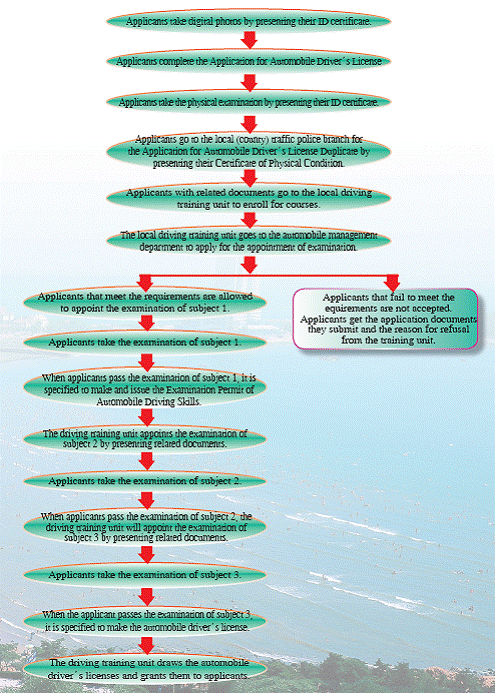
Flow Chart of Exchange of Foreign Automobile Driver's License for Driver's License of the People's Republic of China
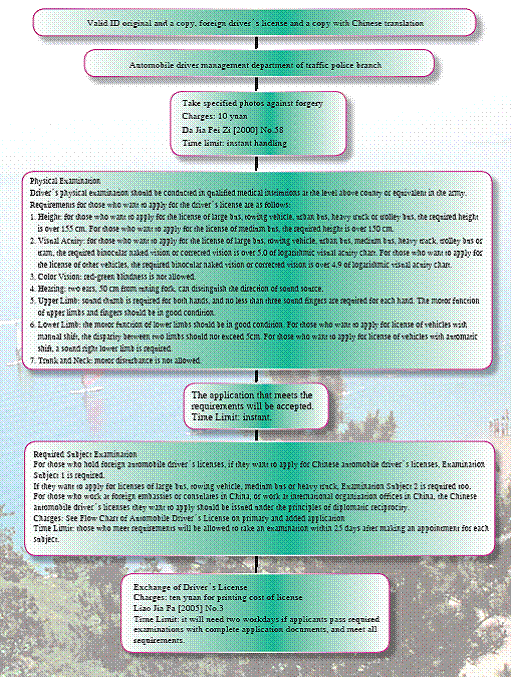
(v) Reference Prices of Basic Elements
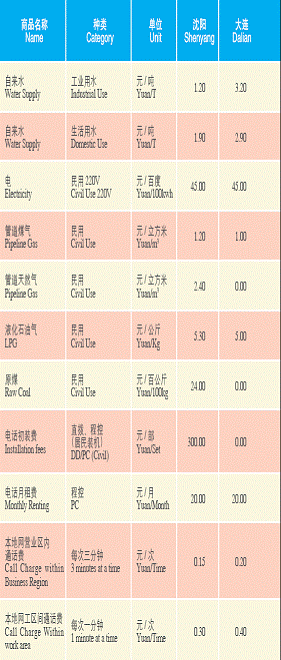
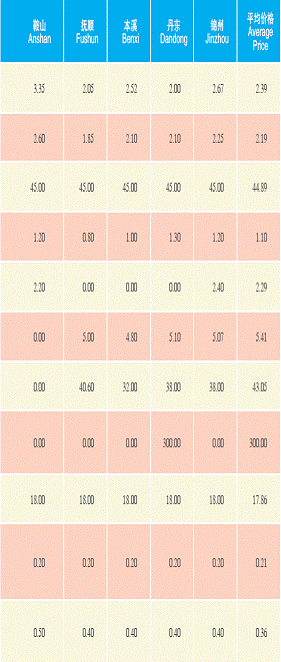
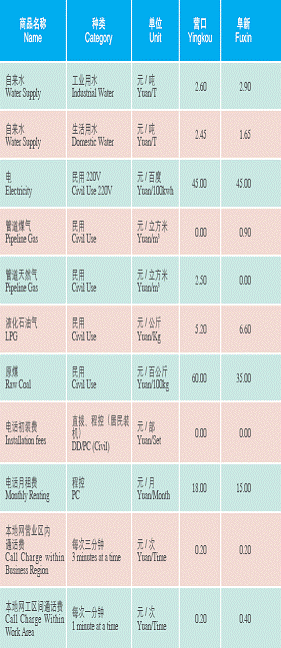
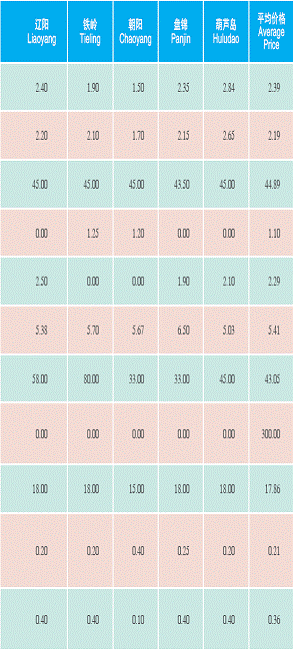
Under the Regulation on Pollutant Charge Levy and Use made by the State Council (the State Council decree No. 369), we formulated the Administrative Method on Pollutant Charge Levy Standards. Please browse the website of Liaoning Environmental Protection Bureau (www. lnepb.gov.cn) to fi nd more information about levy standards.
Standard Land Price List of Cities
Unit: yuan/m2
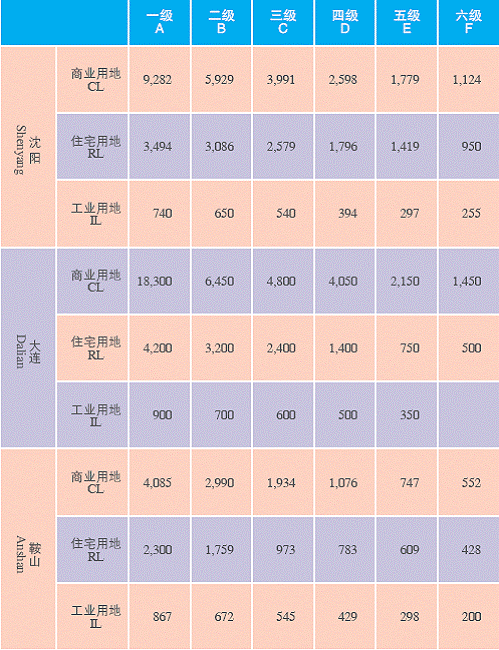

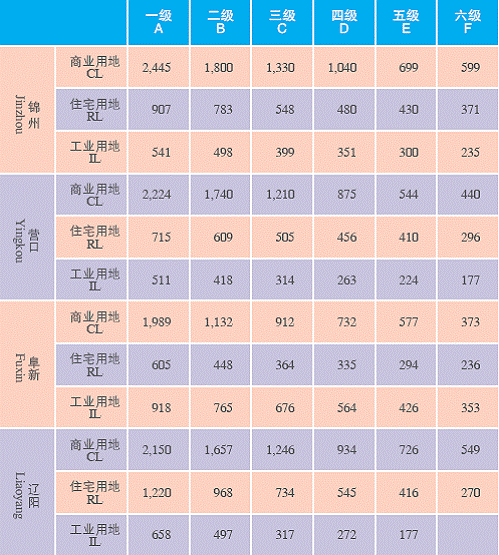

Note:
1. The above land value is defined as follows: within the town planning area, for land at different level and with different quality under the current utilization condition, respectively evaluate the average price of the area, which has the highest legal duration of land-use right, on a determined assessment date according to commercial, residential and industrial purposes. When a specific lot is transferred, it is necessary to evaluate its land value for determination of the base price.
2. The above land value includes: Commercial land: 40 years, six accesses and site leveling Residential land: 70 years, seven accesses and site leveling Industrial land: 50 years, five accesses and site leveling
3. Industrial lands should be transferred in an agreement way, but the granting fees should be no less than the Lowest Standard of Agreement Granting price for the State-owned Land-use Right of Liaoning Province.
4. Commercial and residential lands should be transferred in the ways of bid tendering, auction and hanging out a shingle.
IV. Development Zones
Since the state approved the establishment of Dalian Economic Development Zone in 1984, Liaoning has had 5 state-level economic development zones, 25 provincial-level development zones, and some municipal-level development zones and a great number of economic parks. Therefore, an all-directional, multi-tiered and multi-functional development layout has been formed by upholding the dominance of the state-level development zone and on the basis of the provincial-level development zone.
With more than twenty years of development zone construction, the fixed assets investment in economic development zones at the level of province and above in Liaoning Province has been up to 175 billion yuan, among which the investment in infrastructure is 45.207 billion yuan with 37,174 enterprises that occupy the zones. At present, the development gains increasing momentum. Thanks to the rapid increase in GDP and steady improvement in economic quality, the development zones highlight the economic growth in Liaoning Province.
(i) State-level Development Zones
First built in June 1988, the Shenyang E&T Development Zone was approved to be the State-level E&T development zone in April 1993. It has made remarkable achievements in introducing projects, employing foreign capital, developing export-oriented economy, promoting transformation of large and medium SOEs, and accelerating the updating of the old industrial base.
The Dalian E&T Development Zone is the first State-level development zone in China founded in 1985. Up to now, it covers an area of 36 square kilometers with 1,310 foreign-funded enterprises. The contractual investment is up to 10 billion U.S. dollars, contractual foreign capital 6.7 billion U.S. dollars, and actually utilized foreign capital 3 billion U.S. dollars.
Approved by the State Council of the People's Republic of China in May 1992, the Dalian Free Trade Zone is one of the comprehensive economic areas with greatest opening and preferential policies around the country now.
Approved by the State Council in October 1992, the Yingkou E&T Development Zone has complete supporting facilities in finance, insurance, post and communications as well as Customs, Entry-Exit Inspection and Quarantine departments, and other service institutions in ocean shipping agent, tally, and provision.
Dandong Border Economic Cooperation Zone, a state-level economic development zone approved by the State Council, is located on the bank of the beautiful Yalu River, the border between China and North Korea.
Covering an area of 23.57 square kilometers, it is divided into the Trade and Tourism Area, the Jinquan Industrial Area, and the Donggang Bonded Area.
The above state-level development zones can be in contact in the following ways
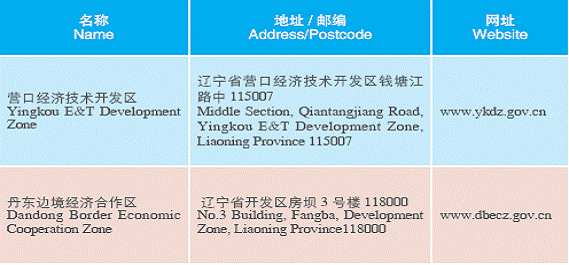
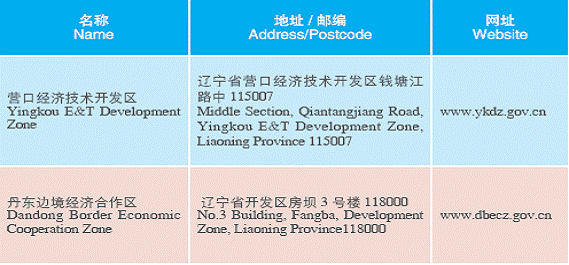
(ii) Provincial-level Development Zones

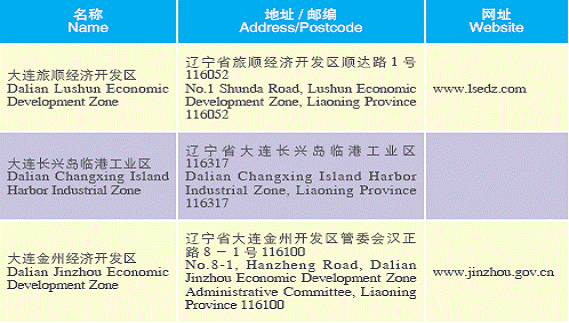
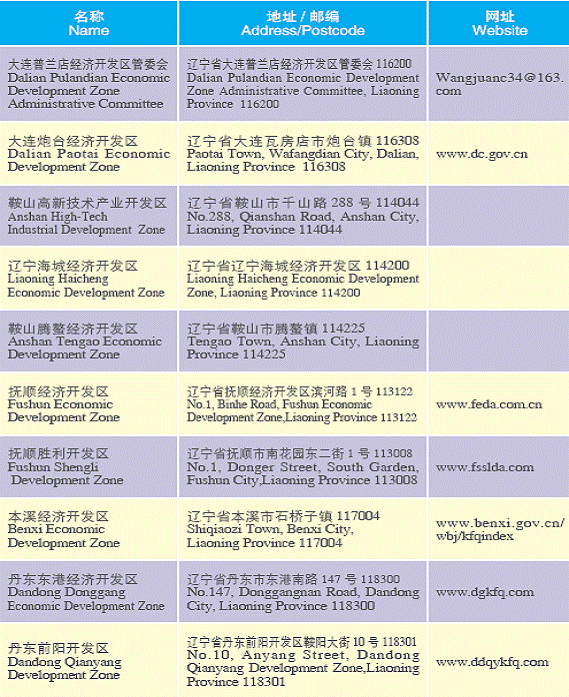

(iii) Related Organizations
Administrative Organizations of Entry and Exit (including port management Organizations)
Liaoning has 10 first-grade opening ports approved by the State Council, including fi ve water ports: Dalian, Yingkou, Dandong, Jinzhou and Huludao; two airports: Shenyang Taoxian International Airport and Dalian Zhoushuizi International Airport; two landway ports: Dandong Railway and Dandong Highway; and one pipeline port unique around the country: Dandong Oil Pipeline.
Business Administrative Organizations
Department of Foreign Trade and Economic Cooperation of Liaoning Province is the component of the People's Government of Liaoning Province in charge of foreign trade and economic cooperation and investment promotion around the province.
Tel:86-24-86892844,86892217,86892613
Fax:86-24-86893858,86892850
E-mail:lnftec@china-liaoning.org
Website:http://www.china-liaoning.org
Department of Commerce of LiaoningProvince is the component of the People's Government of Liaoning Province in charge of the circulation service sector around the province.
Tel:86-24-86894801,86906878,86894810
Fax:86-24-86894422
Website:www.lnsyt.gov.cn
Foreign Affair Organs
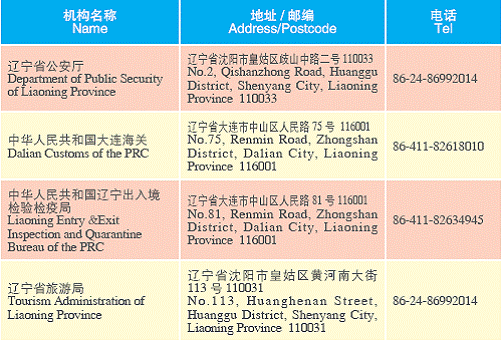

Other Main Business Administrative Organizations

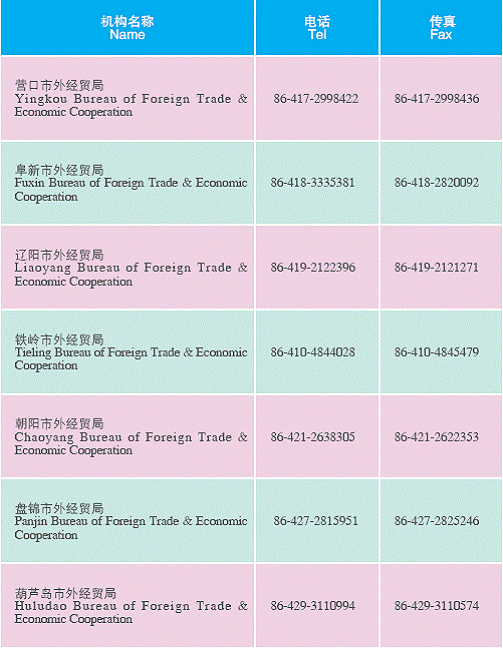
Other Service Organizations
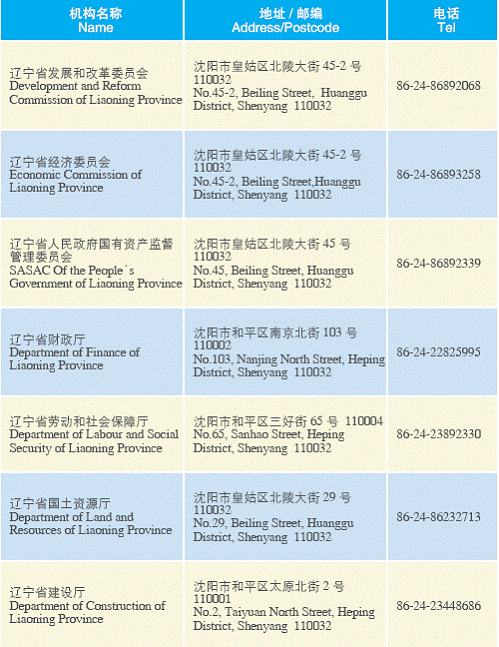

Governmental Websites
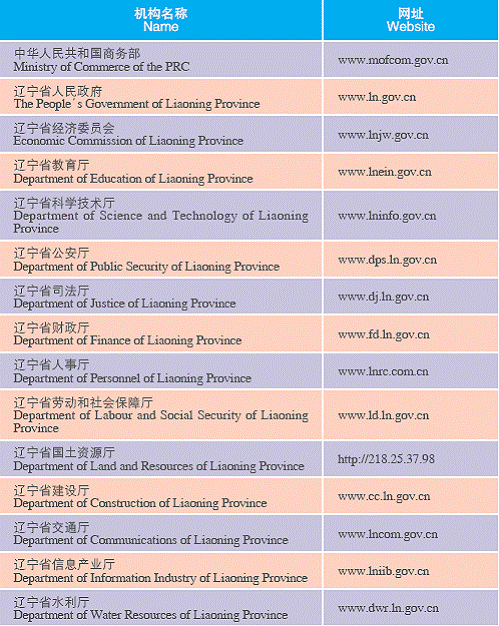
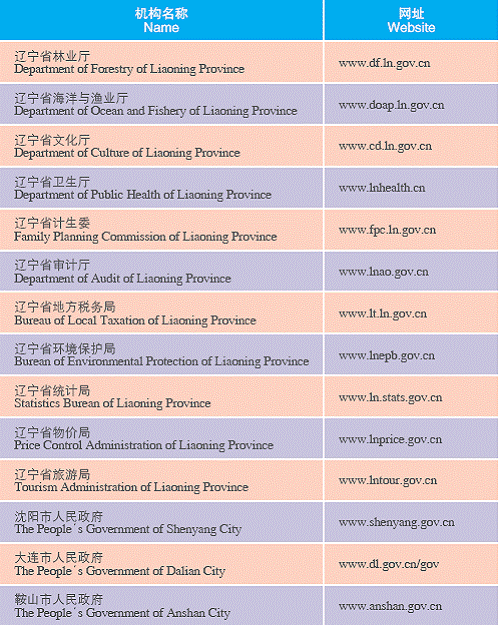
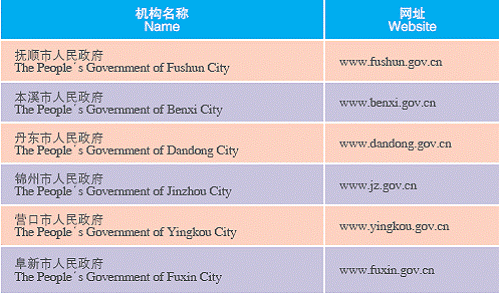
Investment Promotion Websites
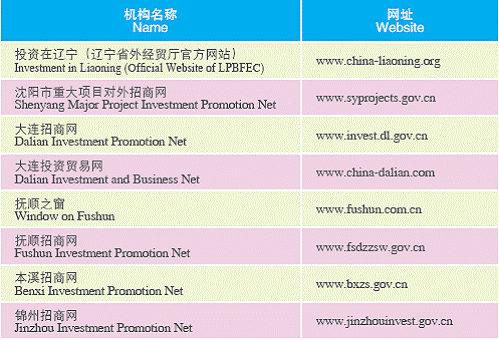

Websites of Business Administrative Organizations
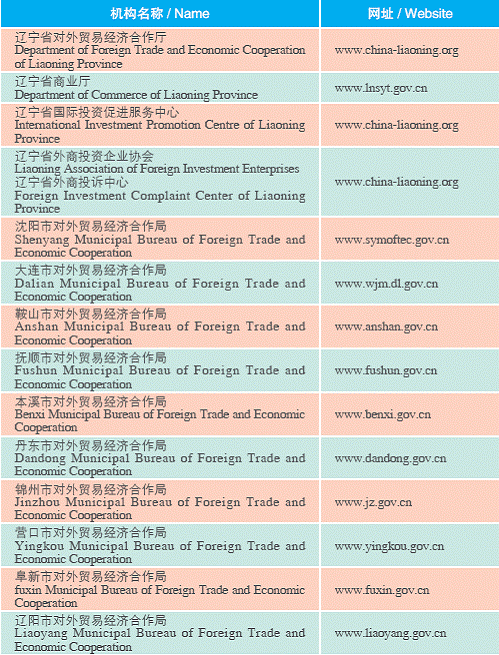
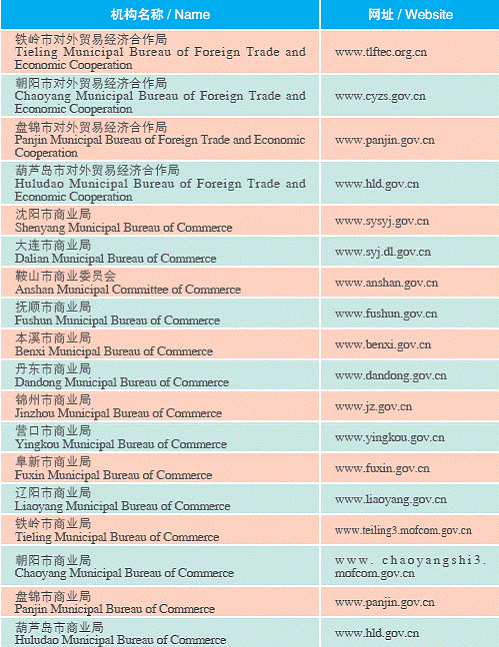
Appendix
1. Main Hotels
Liaoning has about 200 hotels above three-star qualification, among which there are 11 five-star hotels including Shenyang Green Island Forest Park, Shenyang Marriott Hotel, Sheraton Shenyang Lido Hotel, Hotel Inter-Continental Shenyang, Sunrise International Hotel Shenyang, Furama Hotel Dalian, Shangri-la Dalian, Hilton Dalian, Swiss Hotel Dalian, Dalian Harbour View Hotel, Anshan International Hotel, and 47 four-star hotels.
The main hotels around the Liaoning Provinces can be in contact in the following ways:
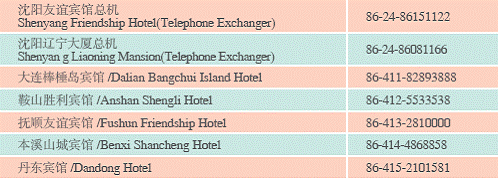
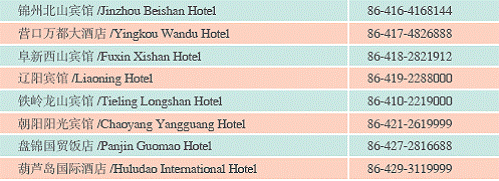
2. Telephone Numbers of Emergency and Inquiry
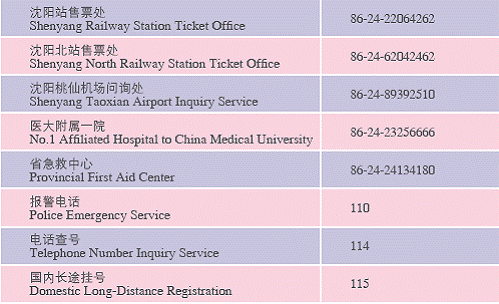
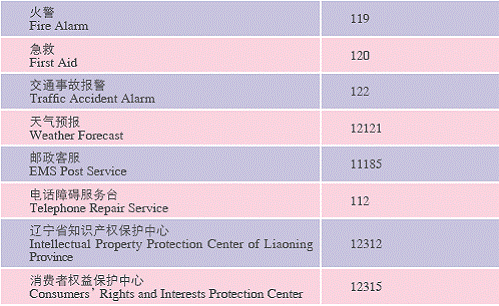
(Ministry of Commerce)